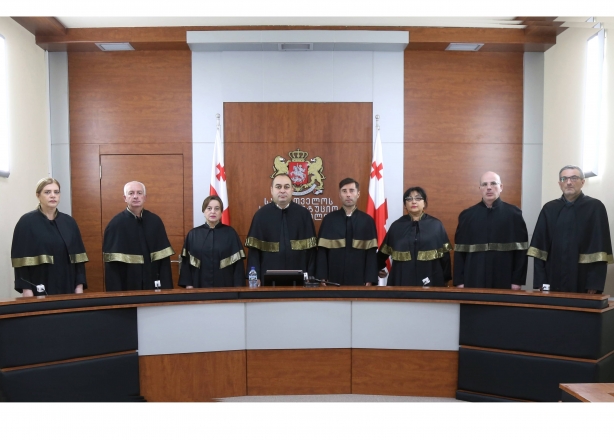News
The Constitutional Court of Georgia Satisfied Constitutional Submissions №1818 and №1861
On 25 July 2025, the Plenum of the Constitutional Court of Georgia satisfied the constitutional submissions filed by Zestaponi District Court and Tbilisi Court of Appeals upon the constitutionality of Article 44, paragraph 4 of the Criminal Code of Georgia.
The disputed norm restricted the possibility of imposing community service as a form of punishment for Persons with severe or significant disabilities (hereinafter referred as “PWDs”), and Women with children under the age of 7. According to the authors of the submissions disputed norm defined discriminatory treatment, since under its restrictions, judges were left with the sole option of imposing imprisonment as a punishment in some cases.
The Constitutional Court of Georgia explained that the disputed norm established differentiated treatment among essentially equal subjects. In particular, based on the disputed norm, the following groups were subjected to unequal legal treatment. On the one hand, accused/convicted with PWDs, and accused/convicted with moderate disability status. On the other hand, accused/convicted woman, with child under the age of 7, and accused/convicted woman without child or has child older than 7 and/or man.
The Constitutional Court of Georgia determined that, in relation to persons with PWDs, the aim of the disputed norm was the legal/social protection of persons with that status, to preserve their physical and moral well-being, which could have impaired the person's interaction with the physical environment or other factors during performance of labor activities. At the same time, based on the analysis of the norms of the Criminal Code of Georgia, the Constitutional Court explained that despite the diversity of punishments in the named Code, when imposing a sentence on a person with PWDs, the judge, taking into account the disputed norm, had the option of imposing only deprivation of liberty in the case of a number of crimes. At the same time, based on an analysis of the norms of the Criminal Code of Georgia, the Constitutional Court defined that despite the variety of punishments available in the mentioned code, when sentencing a person with PWDs, in certain types of crimes, the judge under the disputed norm only had the opportunity of imposing imprisonment.
The Court further discussed that the symptoms and severity of disabilities vary among individuals and do not categorically preclude a person from performing labor, yet the norm categorically excluded community service as an option. Consequently, even when imprisonment was not a proportionate or necessary punishment, the judge lacked discretion to impose a less restrictive sanction.
Based on the above, the Constitutional Court of Georgia concluded that a clearly or significantly expressed rule, adopted with the aim of protecting persons with PWDs, in fact had an adverse effect on them. As a result, the differentiation of individuals lacked a rational connection to the actual achievement of the intended protective goal and could not be justified.
In relation to the women who have children under the age of 7, the Constitutional Court of Georgia recognized the legitimate aim of the disputed norm as the prevention of separation from their children through the imposition of socially beneficial labor, as well as the prevention of disruption in their participation in the caregiving process, which at the same time was directed towards ensuring the child’s normal development.
In the given case, the Constitutional Court of Georgia defined that, in cases where an individual committed certain offenses under the Criminal Code, the disputed norm left the judge with no alternative but to impose a custodial sentence, due to the legal impossibility of imposing community service as a form of punishment. Placement of the individual in a penitentiary facility, in turn, excluded adequate communication with family members, including minor children, as well as with the outside world. In light of this, the Constitutional Court of Georgia found that the disputed norm served as a basis for a decision that was detrimental to the convicted person. Accordingly, the Court defined that the disputed norm lacked a rational connection to the legitimate aim it purported to serve.
Based on reasoning, Constitutional Court of Georgia, in relation to the first paragraph of Article 11 of the Constitution of Georgia, recognized unconstitutional the normative content of paragraph 4 of Article 44 of the Criminal Code of Georgia, insofar as it excludes the possibility of imposing community service, on woman with child under 7, and as for the persons with PWDs, in cases where the only alternative punishment is imprisonment.
The Subject Matter of the Dispute: Constitutionality of the Article 44, paragraph 4 of the Criminal Code of Georgia in relation to the Article 11, paragraph 1 of the Constitution of Georgia.


